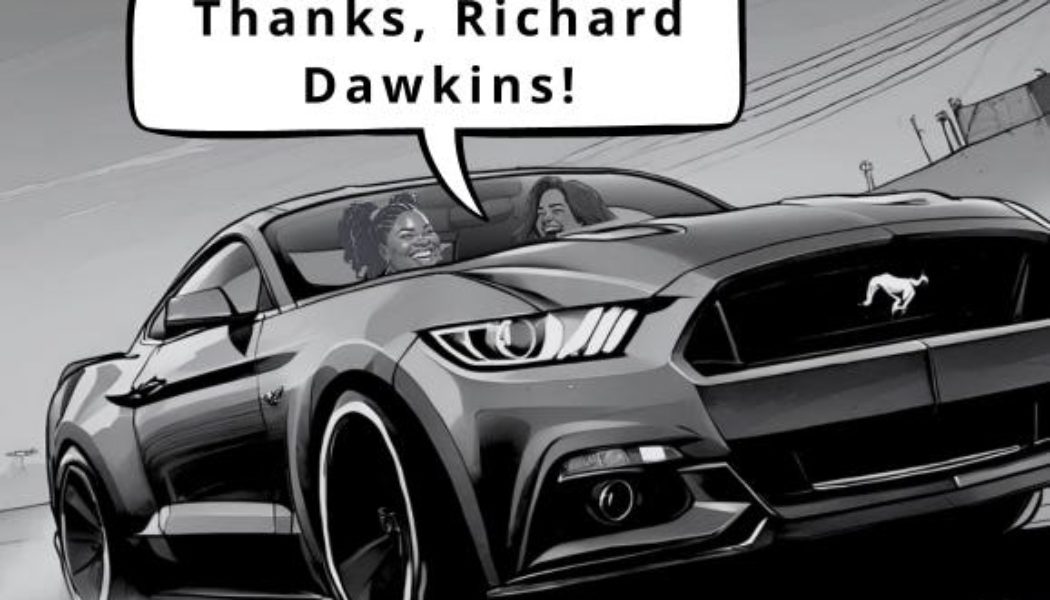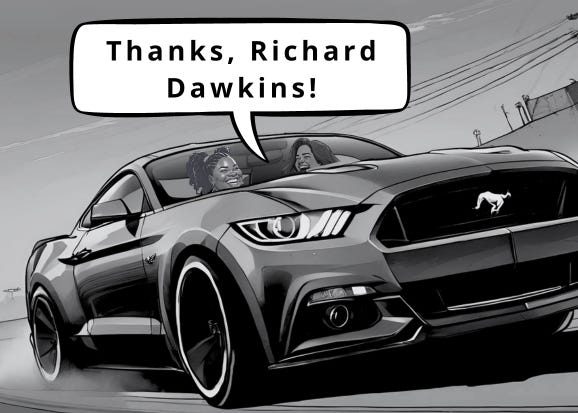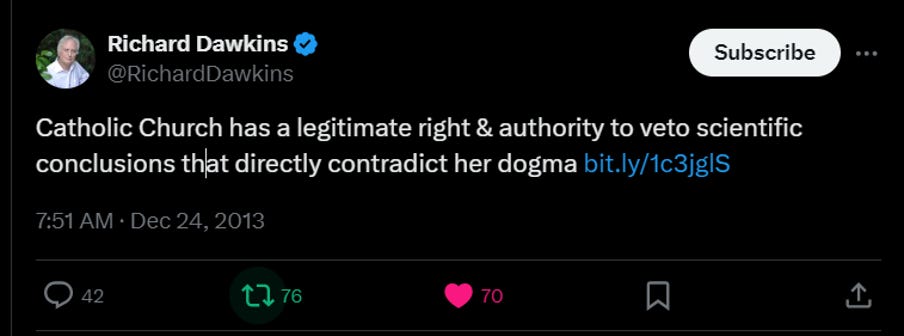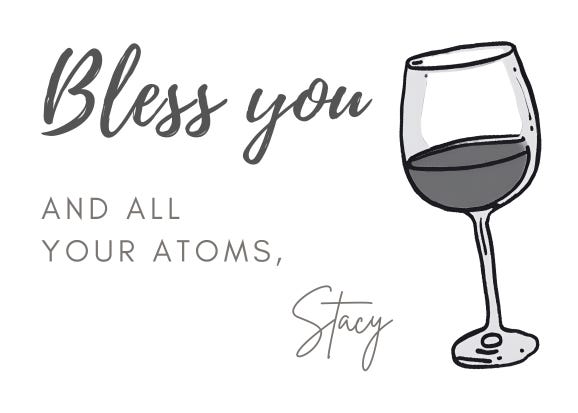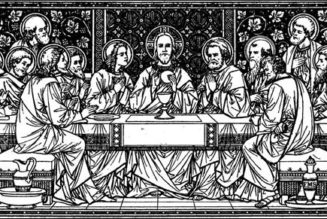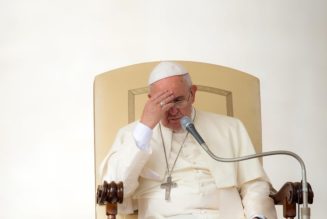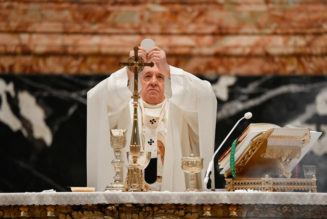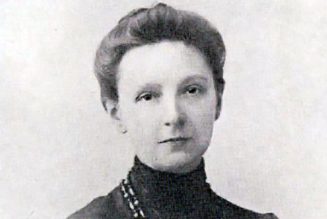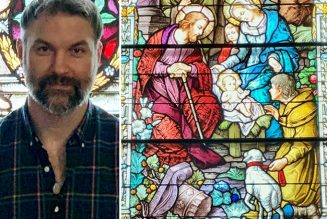Last week, I saw that Dr. Richard Dawkins, Oxford’s popular evolutionary biologist, was going to be in Dallas, TX for the first of his “An Evening with Richard Dawkins: The Final Bow” tour dates. His appearances will continue in ten U.S. cities during September and October. He says this will be his final speaking tour, so I decided I needed to go. There’s a history here.
When I became Catholic in 2006, the New Atheism was at its height. New Atheism taught young people that religion is superstitious and irrational and, therefore, should not be tolerated. Proponents advocated an “antitheist” view that criticism of religion using, what they considered, rational argument, especially where religion and society intersect in politics and education. Dawkins had just published The God Delusion. Two years prior, Sam Harris had published his bestselling The End of Faith: Religion, Terror, and the Future of Reason. Daniel Dennett published Breaking the Spell: Religion as a Natural Phenomenon. Between them, there were many other books prior to and during this time: The End of Faith, Letter to a Christian Nation, The Moral Landscape, Waking Up, Darwin’s Dangerous Idea, Breaking the Spell, and God Is Not Great. There were documentaries, such as The Root of All Evil? Christopher Hitchens, ever the mysterious, was speaking out on the war in Iraq and secret government surveillance. They named themselves “The Four Horsemen of Atheism.”
And together they were formidable. As I engaged with atheists online through the lens of my newfound Catholic faith, I got a lot of questions about how I could be a scientist who believes in God. In the mid-2000s, Facebook still belonged to college students who thought it was weird that a 30-something mother of many children (the number increased from four, to five, to six, to seven during those years) was invading their territory. But oh, did I debate. It was good for me. To refute arguments, I had to look up all kinds of information about the meaning of personhood, why we believe in the Trinity, why we pray to Mary and saints, what angels are, how to defend human life, and whether it is reasonable to grant intellectual assent to the truths of faith. These four were quoted on all issues from neuroscience, free will, ethics, evolution, and science as explaining, well, everything. For the first time ever, I had to defend the science I so loved.
Yes, defend science! That is where Fr. Stanley L. Jaki’s work comes in. In 2010, I enrolled in a distance learning (from home because…many kids) program toward a M.A. in dogmatic theology. His was the first book I was ever required to read in my first course: The Savior of Science. I remember reading it with my seventh newborn in my arms nursing during the late hours of the night, reading Jaki’s book and being so moved that I cried. (It might have been hormones.) Modern science not only is not in conflict with Christianity, but it is also intimately connected with the Christian world view of creation. Jaki’s thesis is that there had to be a birth, the birth of the Second Person of the Holy Trinity become man, for modern science to become a viable discipline of laws and systems of laws.
I ended my degree by writing a thesis on Fr. Jaki’s work because I wanted to get my head around his entire argument. I wanted to understand it because I wanted to share it to a wider audience.
During those days, Dawkins seemed to be the leader of the Four Horsemen. He was compelling and Britishly calm. He founded the Richard Dawkins Foundation for Reason and Science. I tried to read some of his books, but at the same time I was reading Aquinas and magisterial documents, and I had too many questions for Dawkins. He said a lot I could agree with about evolution and biology, but then he would drop something philosophically or theologically so logically out of place, that I could not follow. If I tried to point the leap in logic out to the New Atheists, nada. They weren’t having it. Anyone who disagreed with Dawkins was dumb. End of story.
However, the respect the redoubtable Dawkins earned ended up helping me land my first book deal when I finished my M.A. in dogmatic theology in 2013.
On Christmas Eve of 2013, editor-in-chief Larry Duke of the Freethinker, an atheist magazine in the U.K., wrote an article about my work regarding Fr. Jaki. With a picture of a roundly nine-month pregnant, apron-clad me cooking a pot of mac and cheese (and several pies) with no make-up or hairdo, Duke began, “There are moments when I see something on the Internet that pulls me up so short that I’m left wondering whether I’ll ever get the skid-marks off the marble floor” (article here). You read that right: skid-marks. As in poop. I had lots of more professional pictures on Facebook and attached to my published articles, but I am certain Duke selected the image of me he thought would most discredit me — a busy Catholic childbearing woman slaving over the stove.
I was actually proud of that photo and had posted it as a tribute to our family celebration and pending birth of my seventh child. It was from Thanksgiving Day that year. Duke had no right to steal if from my Facebook profile, but when I asked him to remove it, he just said, “You shouldn’t have posted it if you didn’t want me to use it.” I dropped it. What was I going to do? Sue the Freethinker?
Seriously, though, if I can insert a bit of societal commentary: is it any wonder the U.K. and U.S. are having low birth rates? Even in 2013, the way for a supposedly sophisticated and articulate editor to discredit a woman regardless of her credentials (I had a Ph.D. in chemistry and M.A. in theology) is to post a picture of her serving her family a meal with a smile on her face? I remember thinking, Okay, Barry, bring it! Yes, that is who I am — homemaker. Tell the world!
I was writing about my thesis because I planned to offer it as a self-published e-book on Kindle, with the proceeds going to help another mother in need. In the article that upset Barry (i.e., skid-marks), I maintained that the Catholic Church has the right and authority to ‘veto’ scientific conclusions that contradict her dogma.
“V-e-t-o.”
I was, after all, a zealous and fairly new convert. I was a mother of many small children. In those day, I did not feel like mincing words. My whole life was me getting out of bed every day and telling it like it is. Mothering is not for sissies.
I probably could have used a word other than ‘veto’, such as ‘reject’ or ‘disagrees with’, but I was serious, and still am, that the Catholic Church safeguards truth and in doing so provides us with a great treasure. That is what dogmatic theology is all about. It’s the history of dogmatic development. Part of the development is that the view of the universe as God’s creation had a traceable and real influence on the discovery that mathematics could be applied to the motion of objects (hello? order), which led to modern physics, chemistry, and biology. That history is due to the Church ‘veto’-ing false premises and invalid conclusions.
Where does Richard Dawkins come in? He tweeted the Freethinker article.
It got a little attention. And, lo and behold, on Christmas Day, I received a call from a publisher with an offer to print my thesis as a book titled, Science Was Born of Christianity: The Teaching of Fr. Stanley L. Jaki. Merry Christmas to me! First book deal. Thanks be to God, baby Jesus, Barry Duke, and Dr. Dawkins.
The book did not become a New York Times bestseller, but it got my plan in motion. I had a vision to teach Catholic high school and college students about the scientific heritage that belongs to Christianity, so that they might in turn wish to become scientists, to peer a little more deeply into God’s handiwork of Creation, and then to lead the way to true progress — progress guided by faith and morals. The problem with secular science that is practiced sundered from belief in God is that it is aimless. How can you aim somewhere if you have no purpose. Scientists are people, and they must design experiments. Without a direction or reason to discover nature’s secrets and manipulate matter for the right reasons, science itself has no purpose, except to make this or that person famous. Without any talk of purpose, there is no basis for ethics or virtue. Atheist science is a bunch of unguided arrows shot in the dark.
Over the next ten years, that little book launched me into talks, courses, grants, interviews, and more books, all of which I was able to manage from my home. It also put me in touch with Jaki’s friends and scholars all over the world. I am more thoughtful in 2024 about my delivery, and now that my kids are older, I travel and tell the story of Christianity and science with practiced ease. I still teach grant-funded college courses on how to read scientific literature ‘in the light of faith’, and I show philosophers, theologians, laity, and seminarians how to identify scientific claims that are 1) consistent with, 2) neutral, or 3) contrary to Catholic teaching. Then I show them how to correct errors with Catholic teaching.
That is: we, ahem, ‘veto’ falsehood because truth does not contradict truth.
Army-building, I called it. And I kind of owe Richard Dawkins for the jumpstart.
I always imagined meeting him or debating him someday, walking out on the stage with a tray of cookies. Hi y’all, I’m that mama from Texas that knows how to synthesize cheesy macaroni like a boss. Sit down. Let’s talk. Never happened.
At any rate, I wanted to go see him speak in Dallas yesterday. I wanted to hear his ideas at age 83 as he must be thinking about the end of life and his legacy.
I didn’t want to go alone, and my husband was out of town. So, I asked a lovely and hardworking writer-scholar, Briana Jansky, who lives nearby if she would like to accompany me. Briana and her husband, Daniel, are co-founders of Catholic Quill. (Please check out their site!) She has contributed to various Catholic publications such as The Catholic Stand, Black Catholic Messenger, Radiant Magazine, and Our Sunday Visitor. She is working toward her B.A. in Philosophy from Holy Apostles College and Seminary, one of the schools where I teach.
We, of course, took my Mustang. Vroom. Off we ladies went to Dallas to hang out with atheists. At the venue we found that we blended in well with the crowd, all dressed in black as we were. By the end of the night, we had shared much more than this memorable event. Turns out, life has thrown us both some curve balls and we both try to avoid, as she aptly said without even knowing about my daydream of meeting Dawkins on stage, being “cookie-cutter” Catholics. (I had a tiny touché moment.) She is also astonishingly versed in metaphysics. Nothing is so satisfying as connecting with a like-minded person and being understood. We became friends. And I suppose I have Richard Dawkins to thank for that too.
I’ll share my notes and thoughts on his talk next time. Meanwhile…
